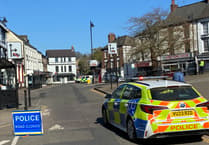MANY congratulations to Kate Fowler, of Animal Aid, and 'Boar Fan' for their much-needed letters (Review, January 6) about the boar 'problem,' and to Andrew Tyler, also of Animal Aid, for his timely reminder of the cruelties and slaughter behind the oh-so-English 'sport' of pheasant shooting. Predictably, they've attracted some flak, so some words in their defence.
As Kate Fowler and 'Boar Fan' both point out, the wild boar are being blamed simply for trying to exist, while the humans responsible for their being loose in the UK countryside in the first place escape censure entirely, even though technically they've committed an offence.
These boar have been dumped on us. A few years ago, a number of farmers and landowners spotted an 'opportunity' (for which, read quick profit-snatch) in rearing wild boar for the speciality meat market. The prolific reproduction of these creatures obviously proved attractive as a means of rapidly increasing yield, and cross-breeding the animals with domestic pig breeds made them supposedly more amenable to captivity. Marketing the meat was easy enough – the rise of the rock-'n'-roll superchef on TV had created a curiosity for novelty foods – and so 'wild' boar meat quickly took its place alongside kangaroo burgers, water buffalo steaks, biltong and the rest on butcher's slabs, pandering to some people's desire to appear sophisticated.
Unfortunately, some of the boar escaped from their pens, often due to carelesssness or neglect on the part of their owners. Others were deliberately let loose into the countryside when the market deteriorated or reached a glut and their rearing became unprofitable.
Like Butch and Sundance of a few years ago (many of the boar were cross-bred with Tamworth pigs) they developed an affinity for surviving in the woods and thickets, and now they're back in the wild (and not so wild) areas of Britain after an absence of 300 years.
So like it or not, we humans have to accept some culpability for their being there. Without the 'pose factor' that drove some customers to purchase boar meat in the first place, the problem wouldn't exist.
The same 'pose factor' was evident in the BBC's far from even-handed Inside Out: West feature on killing squirrels for their meat, all of the 'vox pop' respondents coming on like seasoned epicures while trying the meat, when for most of them sauce probably comes out of a bottle on the table, not from a cooking pot on the stove. The irresponsibility of the rearers in letting the animals loose compounds the situation. I've yet to see anyone tracked down and prosecuted for their actions. Well, they wouldn't, would they? Far easier to blame the animal and call for its extinction.
And so we now have the slow but increasing tendency to demonise the boar, which of course makes it easier to remove the problem. One of the less pleasant aspects of human nature is its frequent need to find a scapegoat onto which all of the finger-pointers' own fears, problems and inadequacies can be conveniently offloaded, often with violent and fatal results.
When our Cro-Magnon and Neanderthal ancestors first clapped eyes on one another across the river dividing their territories, each probably recoiled at the sight of the other's difference and reached for their flint spears. And so it has been, all through the ages – tribe against tribe, nation against nation, religion against religion, race agains race. Wars, conquest, imperialism, colonialism, slavery, genocide have all been justified on such grounds. And even today, when we're trying to eliminate these odious evils from human behaviour, we still find some of this need for a 'victim' lingering on in our attitudes towards some animals. Fear of the others lingers on from our primeval past.
So are the boar dangerous? Well, if you get too close to them when they're tending their young you might have a problem. Best to keep a safe distance, surely, and don't try to feed them. Many of the older ones still remember being dependent on their owners for food, and so associate people with quick and easy grub. If they're allowed to remain in the wild, each successive generation will become more and more independent and re-develop their true shy and timid nature, and they'll be seen less and less often.
Their breeding rate is a problem. Surely the scientists can be encouraged to develop an oral contraceptive more quickly than the 10-year timespan recently cited? And equally, shouldn't we also be looking towards producing similar contraceptives that can be rolled out to ensure fallow deer and grey squirrel populations can be kept to the desired level without resorting to the rifle and cage-trap?
If a fraction of the money used to fund the various badger culls down the years had been diverted towards developing an effective vaccine against bovine TB instead, we might now be in the enviable position of having saved dairy farmers from ruin, and badgers from a cruel fate, and even be able to recoup the outlay costs by selling the same vaccines to other countries. But no, far more convenient to reach for the cyanide gas cylinder (the same gas used at Auschwitz, I believe, and you thought the Final Solution was all in the past? If its victims have four legs instead of two, that makes it OK?). Fear of the 'other' must be assuaged somehow, and that Old Testament fundamentalist concept of beasts being put on the earth solely for man's benefit duly reinforced.
For all the undeniable human deaths from attacks by sharks, poisonous snakes, maneating lions and tigers, saltwater crocodiles, rampaging hippos, elephants, rhinos and other creatures, such fatalities remain, and always have been, an infinitesimally tiny fraction compared to those inflicted by many on his fellow man, through war, persecution, turning one's back on famine and starvation in less fortunately countries, crime, homicide, dangerous driving, drug dealing and the like. If we're looking for the authors of most of the world's ills, we would be better advised to gaze at the faces that stare back at us from our bathroom mirrors each morning. It won't be polar bears that finally render this planet largely uninhabitable...
Like 'Boar fan,' I too have yet to see the boar, though I've often come across where they've been. Yes, they cause damage to the grass and plant cover, but so does the increasing use of heavy machinery in the woods, and the deliberate and flagrant destruction by illegal motorcyclists (not lads but yobbos, frequently under the influence of drink, drugs, pills, Red Bull, lighter fuel and other 'stimulants') and off-track mountain bikers.
Worried about the bluebells? Well, a couple of weeks before Christmas a JCB was used to excavate drainage ditches along two sides of the rugby pitch at Cinderford Bridge. Such work was probably needed, to avoid flooding problems, but even so, some 400 to 500 bluebell bulbs were uncovered by the digging and simply left to die all along the new channels. I've replanted most of them, but given that they'd already been exposed to night frosts for several days, whether they'll survive remains to be seen.
Not long ago, I recall, muntjac deer were copping the blame for destroying the bluebells in the Dean. Oh dear, there's 'the other' creeping in again. When it's two-legs doing the destroying it's OK, when it's four-legs, well...
Will I ever get to see any 'wild' boar, or will they be killed off before I get my chance? I would hope we could move towards a more enlightened attitude towards animals and understand that human beings are often far more dangerous.
Six years ago, I was bitten by an adder. I wasn't entirely sure I'd actually been bitten by a snake (not having seen it) I didn't seek medical treatment. When the symptoms finally emerged and removed all doubt, I was too weak to struggle up to the health clinic. It wasn't pleasant, but I'm still here. (Anyone else, if you think you've been bitten, stay calm and see a nurse or doctor, best to be on the safe side). But statistically deaths from adder bites occur about once every two years in the UK – you've far more chance of dying from lightning strike. And yet, in some parts of the Dean it was the custom until fairly recently to set fire to areas of gorse and heather to kill off adders. The fact that many other creatures suffered agonising and unnecessary deaths didn't enter the equation. That old blame culture again.
I've come into quite close contact with the Forest big cats on three separate occasions. On two consecutive days in July 2004 I disturbed a young puma near Plump Hill (no room for doubt about its identification). On both days it simply ran past me at speed, intent on getting away for its own safety, not on threatening my own. On the first such occasion it passed at about 20 feet away – perfect opportunity to pounce on me and rip my throat out (!) but it didn't take it, far more fearful of me than I of it. In November 2006 the black panther emerged from a side-path near Yew Tree Brake half a minute after I'd passed by. It simply stood and gazed at me for a while before slowly loping off. Again, no attempt to menace me. How long will poor old Boris and his chums be allowed to remain here, given the way things are going? Remember, they're only here because irresponsible humans dumped them here.
So, no dangers from animals for me. And yet, today I don't see too well with my left eye because some years go some kind soul deliberately shone a powerful torch into it (at the time I was writing letters to the press against blood sports and the destruction of natural landscape for construction projects, whether there's a connection here I've no idea). And my right hip and leg don't work quite as well as they should because on Good Friday morning of last year I had a violent encounter (deliberately engendered by them) with two of the aforementioned illegal scramblers near Foxes Bridge. When I stood my ground and refused to back down one of them drove his bike into me with force, and now it seems there's some permanent damage. I sometimes feel that if I don't make my proverbial three-score-years-and-ten, it won't be animals that cause my premature demise.
There's a rather unpleasant lawless, redneck tendency starting to arise in the Forest – some of the residents have clearly mistaken West Gloucestershire for West Virginia. Drink, drugs and substance abuse often lies behind it, but the rise of the political right must also share some of the blame, I think.
We need a new approach, away from violence. One of the most memorable media images emerging from the horrors of the Australian wildfires was that of the burly Australian firemen gently giving water to the female koala bear he'd rescued, tenderly holding its injured paw to reassure it. A useful antidote to recent photos of Aussie hunters gloating over slaughtered razorbacks, and a timely reminder that the same country also produced the late and sorely missed Steve Irwin.
Put the guns, the poison and the traps away, please. There's always a better way if we only look for it. Let's prove we're fit to have mastery over the earth and all the beasts and birds of the air. Or do some of you actually need to kill something that can't fight back. – Andrew Stephens, Cinderford.



